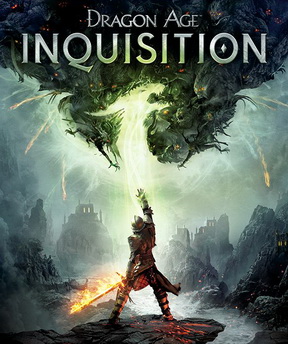Dragon Age and the Reality of Religion
April 24, 2023
What if Christianity was founded by Joan of Arc instead of Jesus? What if the Greek gods were just powerful demigods who ruled over people? What if ancient Sumerian gods were plague bearers who spread the Black Death?
These are all questions that form the basis of major religions in BioWare’s Dragon Age. The series is known for taking your traditional fantasy tropes and subverting them. Mages are locked away and feared, dwarves are scheming bastards, and elves have been brought low with no place or kingdom to call their own. Religion is no outlier, and it brings something new to the table. Namely, it brings a new outlook on our religions through this lens of fantasy.
Dragon Age: Inquisition brings you into the role of the Herald of Andraste, this universe’s messenger of the messiah, someone who was in the right place at the right time and has now become fated to save the world from a rift in the sky. Whether you are a human, elf, or dwarf, you are forced into a role that you most likely do not want and represent a god, this divine Maker, you possibly don’t even believe in.
No one listens to you, or what you believe. You are forced into this role as a holy figure, elevated to a demigod status by people across the world—
And who you are doesn’t matter one bit to them. Everything you are is erased in the name of Andraste. You become a martyr, just like this prophet, just like Jesus, just like Joan of Arc. The Chantry has erased your identity to fit their narrative. How many people do we know of, and how many cultures do we know about, that have been warped or outright erased to fit the “official story” given to us by a religious institution?
In this world, history is often changed to fit the narrative the church wants. We don’t know anything about why elves and humans hate each other, or really what started the wars and the Holy Crusades that drove the elves from their rightful homeland. They are forced to abandon everything they have ever known, much like people in Israel during the Crusades.
High up in the far north of Scandinavia, one king, Harald Bluetooth, forced the Danish and the Norse to convert. His message was “convert or die.” The Norse gods were all but wiped out, erased, and now we fight to reclaim what was lost. The spiritual revival of the old Norse religion in the 19th century helped get the religion to where it is today, but even now we are scrambling to reclaim what was lost. The knowledge we once had of these gods and their celebrations is limited. What little we do know has survived through assimilation into Christian culture and holidays.
There is a system of power in place that silences or warps you if you pose any threat to the Chantry. Elves, who once believed in their own gods, are forced to convert, and follow the human’s Maker. How often in history have we seen people forcibly converted to a religion in order to stay alive?
Dwarves practice ancestor worship. They look to their ancestors for guidance, often asking, “What would my ancestors do?” This guides their actions, much like how the Maker guides the Chantry, and guides the people spread throughout the world.
Those who believe in the Chantry and follow the Chant of Light believe all people were born in the Maker’s image. Sounds familiar, doesn’t it? But the religious folk don’t even recognize dwarves as people because most of them refuse to follow the Maker and His teachings. Doesn’t this remind you of people who are dehumanized because they don’t follow a major religion, or just follow a completely different religion?
I cannot tell you how many thousands of times people have told me I am not one of God’s children – all because I’m not straight. I’m told that I deserve to burn in hell, that my family must be very upset to have “a child” like me. I am dehumanized and told I am not a person. Much like the dwarves of Dragon Age, I am considered a sinner who is unworthy of God’s gifts.
In this world, people are taught that magic is meant to serve people instead of lording over them and running around unchecked. To make sure this happens, the Chantry constructed these “circles” across the world where they keep mages. Templars, knights who fight and negate the effects of magic, are employed to watch over the mages in case they fight back.
People who have magic are often ripped from their families and taken away. If you fight back, you are made “tranquil,” a fancy way of saying that you will become a drone with no emotions, no desires, and no drive to take care of yourself. This is if you don’t end up getting killed by a templar. You are not allowed to fight nor leave. You will not escape. The Chantry, of course, covers up this abuse of power. Doesn’t this make you think about the abuses done by our churches, by our pastors?
We are no strangers to the allegations against priests in the Catholic Church molesting children. These cases have been documented dating back to the 1940s. The Church did whatever they could to cover it up. How many priests were convicted of sexually assaulting minors, the very children of God they are supposed to teach and protect? Most people refused to speak up, or didn’t because they were being threatened. They were being silenced in some way. It’s yet another case of the abuses of power carried out by those above us in the institutions we might serve.
Homosexuality is yet another issue that many believe is a “choice” that needs to be “fixed.” Within the Dragon Age universe, there are instances of this happening. One character you meet is a gay man named Dorian, a nobleman. During a quest that ties in to his past and involves his family, you learn Dorian’s father wanted him to shut up, hide his sexuality, and dutifully produce scions. Dorian’s father purposely used dangerous methods to “correct” the sexuality of his son whom he claims to love.
This brings to mind the forced conversion therapy and summer camps that many young homosexual men and women endure. All because people who claim to love them say that their love—along with who and how they love—is wrong and a sin in the eyes of this God that supposedly made them who they are. Of course, we know this doesn’t work, and all it does is breed resentment. After conversion therapy, people often come out depressed. They’re broken, empty, a shell of who they used to be.
I am by no means religious but do believe in a higher power. After playing Dragon Age: Inquisition again – despite it being an almost 10-year-old game – I always walk away with something of substance. This most recent playthrough, I found myself drawing parallels between our history with organized religion and their history with organized religion. I saw the allegories used, and how the developers made it a social commentary.
Let me be clear: I am not at all saying religion is bad. I am not even saying that organized religion is 100% bad. What I am saying is that we need to look long and hard at what it has done to us. How many people have suffered because of placing blind trust in the church? We need to hold the churches and religious authorities accountable for what has been done. Don’t be afraid to question the decisions made and question their interpretations of the Holy Texts.
Not everyone will agree on how to interpret the Holy Texts. Interpretation is up to each of us. Nothing is perfect. It never will be, but we can try to make it a better place where everyone is accepted. To quote Sister Leliana from Dragon Age, “[The Church] should encourage the good in everyone, rather than rebuke us for our sins. No one is without worth.”



